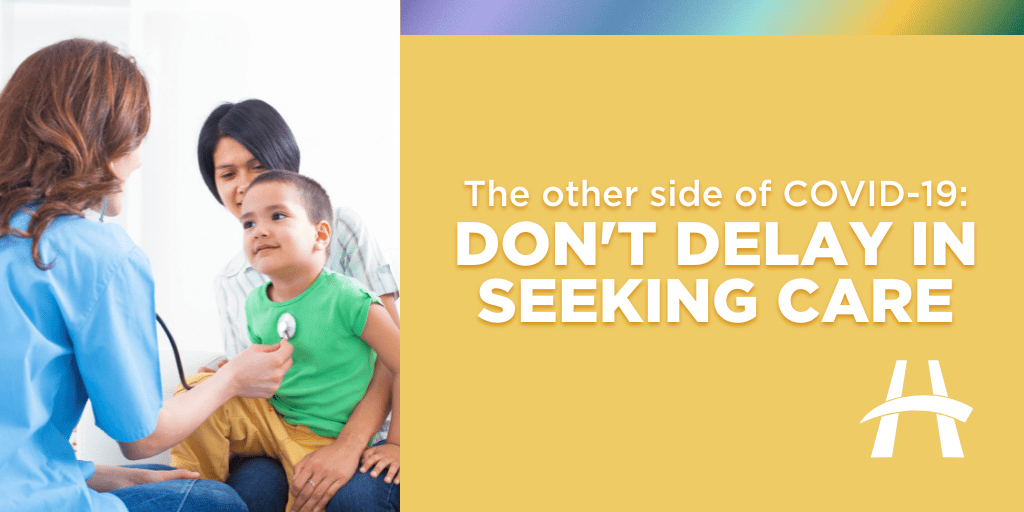
The other side of COVID-19: Fewer emergency visits and more missed appointments
Even during the pandemic, it’s important for parents to keep up with their children’s routine medical appointments and to bring them to the emergency department if they are seriously unwell.
Experts at McMaster Children’s Hospital remind parents to seek medical attention as appropriate.
During the first two waves of the pandemic, visits to McMaster Children’s Hospital’s emergency department decreased by almost 50%. View our fact sheet.
“It’s important not to avoid coming to the hospital or your specialist appointment because you’re worried about COVID-19,” says Dr. Nikhil Pai, pediatric gastroenterology doctor at McMaster Children’s Hospital. “Delays in seeking care from your specialist can result in serious harm to your child, including death.”
An emergency is an emergency, even in a pandemic – and especially for children
Anyone 17 and under who is injured or seriously unwell should visit the McMaster Children’s Hospital (MCH) emergency department (ED) or another emergency department in Hamilton.
MCH has seen a significant decrease in visits to the pediatric emergency department which is worrisome to doctors. Between April 1, 2020 and February 29, 2021, compared to the same time period the previous year, there was a 45% decrease in overall MCH ED visits.
Doctors have also seen the effects that the stress of COVID has taken on children, teens and their families, with an increase in visits for mental health concerns, as well as visits that involve physical symptoms such as abdominal pain, headaches, malaise and chest pain ultimately being attributed to the stress of the pandemic, says interim ED chief of emergency medicine at MCH, Dr. Chrisopher Sulowski.
Visits to the MCH ED have been increasing since March/April 2021, with July 2021 being the first month since the beginning of the pandemic where the number of visits was similar to the same month in 2019.
During the fourth wave of the COVID-19 pandemic, it’s important to remember the ED is open, safe, and here when you need us.
When to visit an emergency department
Children can get very sick very quickly. If you would have sought care before COVID, you should still seek care now. An emergency is an emergency, even in a pandemic.
Visit the emergency department if your child has any of the following:
- Injury or pain. For example: a broken bone, a cut that won’t stop bleeding, or potential head injury
- Difficulty breathing
- Dehydration or not drinking well. For example: not peeing, no tears, dry mouth, persistent vomiting
- Altered level of consciousness
- Fever for five or more days
- Significant concerns about their mental or physical well-being or safety
- If you’re unable to access routine care and you’re worried about your child
“We want parents to know that if they are worried about their child, we are here for you,” says pediatric emergency doctor, Dr. Anthony Crocco. “If your child is dehydrated or not drinking well, if they are having trouble breathing, if they are injured or in too much pain, if they are not behaving normally or simply if you are worried, please come and see us right away. And, even though some symptoms, such as chest pain, headache, malaise or abdominal pain can be attributed to pandemic stress, leave it to our team of trained medical professionals to help rule out other, more serious causes.”
Sub-specialty clinics
All of our clinics are still providing care. Many outpatient clinics can provide virtual appointments, keeping you safely at home while still offering high quality remote consultation, while others will need you to visit in person.
“Chronic conditions continue to be diagnosed and continue to need ongoing treatment even during the pandemic,” says pediatric oncologist, Dr. Stacey Marjerrison. “Subspecialty teams across the hospital are committed to maintaining high quality, safe care for all our patients amidst the pandemic.”
In the 2019/20 and 2020/21 fiscal year, about 20% of people have either cancelled or not shown up to their appointments at MCH.
“It’s so important to your child’s health that you don’t miss your specialist appointment so they can continue to receive the care they need,” says pediatric rheumatology doctor, Dr. Liane Heale. “It’s especially important to contact your subspecialist for advice if your child has a flare up in their chronic medical condition.”
When to visit a specialist:
- Any questions or concerns about the condition that your child is being followed for
- Any worsening symptoms of your child’s chronic condition
- Prescription renewals for medicines that your specialist is managing
Primary care
Your “primary care physician,” also known as your family doctor, can help with new non-urgent issues and may be able to provide both in-person and virtual visits. Family doctors continue to have 24/7 access to emergency doctors and most subspecialists by phone for consultation or referrals.
When to visit a family doctor:
- Questions or concerns about symptoms of a cold
- Questions or concerns about a new symptom such as a rash
- Prescription renewals
- Routine vaccinations
- Assessing any long-standing and non-worsening symptoms (for example, headaches, joint pain, constipation) which may require treatment and/or referral to a specialist
If you don’t have a family doctor, register with Health Care Connect.
Our hospital is safe
We have taken many steps to make sure that coming to MCH is as safe as possible.
“This increased safety is seen from our parking garage screeners and entrance way screeners, to our ED unit clerks asking extra questions and limiting visitors, to some of our triage process now happening in individual patient rooms if a patient is identified immediately as COVID positive or high risk,” says Sulowski.
- Masks are required from the moment you enter the hospital.
- Our waiting room has distanced seating, and our touch screen games, which the kids usually love playing on, have been turned off.
- All of our staff wear masks at all times along with eye protection. For many patients, staff will wear additional gowns and gloves before seeing your child, and we even have dedicated extra stethoscopes that are room/patient specific and cleaned between patients.
- Hand washing is very frequent and has always been important but even more so now in the pandemic, both for our staff and patients and families.
- Our Environmental Assistants are working hard to clean rooms between patient visits and all our staff self screen prior to coming to work.
- HHS is working on implementing a vaccine policy for staff.
In case of an emergency, call 911 or visit:
McMaster Children’s Hospital
1200 Main St West
Hamilton, ON L8N 3Z5








